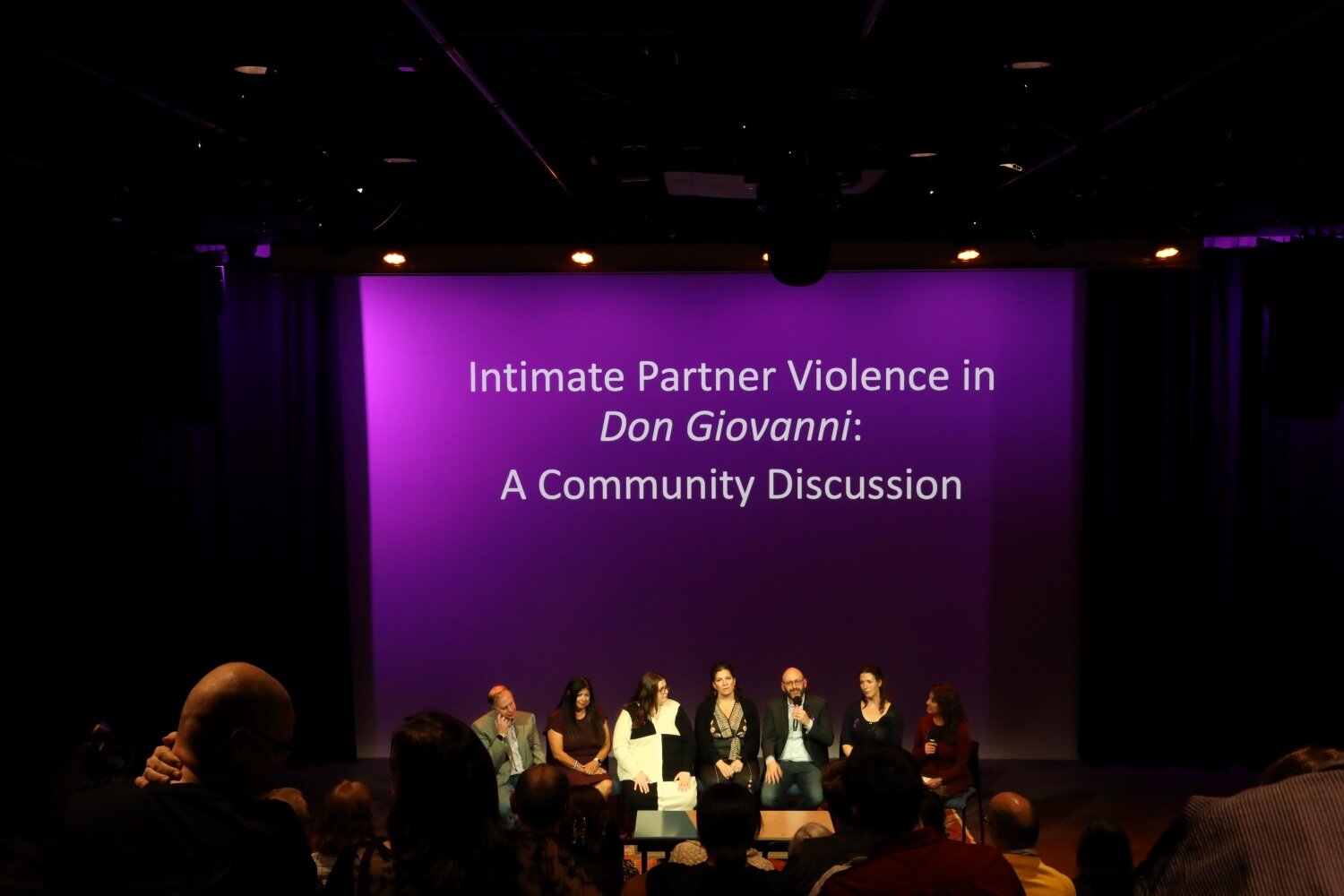Reexamining Mozart's 'Don Giovanni'

DENVER — An agitated Donna Anna runs out of her father’s house, chasing after a masked assailant who had just entered her bedroom, attempting to assault her.
This is the opening scene of one of the most timeless and beloved operas ever composed by Mozart: Don Giovanni. And the man who committed this horrific act of sexual violence is the main protagonist.
Now, over 200 years after the opera’s first performance, conversations are emerging about this opera and the deeply immoral and abusive ways the titular character treats women.
It’s an issue Opera Colorado is confronting head on as it kicks off its 2023-2024 season next month with a production of Don Giovanni.
On Wednesday evening, Rocky Mountain Public Media hosted a panel to discuss the treatment and portrayals of women in the theater and how to showcase seminal works like Don Giovanni with sensitivity and social consciousness. Performers and the director of Opera Colorado’s Don Giovanni, gathered with staff from The Rose Andom Center, a center for survivors of domestic violence, and Jack Sheinbaum, professor of musicology at Denver University, for an in-depth conversation.
During the first few days of rehearsal, establishing a safe environment centering on consent was essential, explained stage director David Lefkowich. Early in his productions, he works on building trust, identifying what can be difficult and talking about the ways the performers and crew can work with those difficult themes. “It’s important to set up right from the beginning that this is a safe place, that they are allowed to take breaks, to egress from this situation and take time.”
Ellie Dean, who performs the role of Donna Elvira, said the cast attended intimacy trainings as part of rehearsal. “We got to learn each other's boundaries and how to ask for consent. And with the some of these difficult scenes, to make sure that we're all on board with what's going on. So there's nothing that you will see on stage that we haven't consented to ourselves.”
Don Giovanni tells the story of Don Juan — a person of nobility who uses his power, wealth, and status to seduce women, often acting in lecherous and deceitful ways. He often discredits women, deeming them ‘crazy.’
“We talked about gaslighting in this show all the time,” said Lefkowich. Gaslighting is a psychological tactic that is intended to keep the recipient questioning their own reality. “It’s a really quick way to write off someone's very real experience,” said Lucia McNeal, a client services manager at The Rose Andom Center.
If someone is experiencing some type of anxiety or depression, it can be exacerbated in a domestic violence relationship. “This is really problematic because it's very much victim-blaming and it doesn't really focus on what is happening in the relationship and the experience that Donna Anna is having or any survivor of domestic violence.”
And still today, viewers question why the female characters remain romantically tied to Don Giovanni.

“'Why is this guy abusing her' is the question we want to ask instead of why she stayed with him for so long ... I like the fact that it’s an opera written so long ago and is still so relevant to today,” said Lefkowich.
The Rake Punished or Don Giovanni, is the opera’s full title. Right from the beginning, the framing of the opera is that Don Giovanni is sinful and he is going to be punished. At the same time, the opera sits in Mozart's catalog as an Opera Buffa, a comic opera, and some situations are played for humor, said Sheinbaum.
One of the most famous pieces, known as the Catalogue Aria sung by Giovanni’s servant Leporello, is about a book where he has recorded the thousands of women that Giovanni has slept with. The women are treated like objects and “Mozart throws in humorous descriptions about tall women, in short women, skinny women, fat women, women from different nationalities.”
But then when Giovanni attacks Zerlina, the music quickly turns very serious, Sheinbaum explained. “Zerlina is screaming at the top of her register. The music suddenly shifts to a very agitated minor mode. And so you can tell right away this is a serious situation. But at the same time, there's also this comic edge that's there, which can be tricky to deal with.”
Nonetheless, “the art is doing some very complex things,” he said, “and the women in the opera really have a three-dimensional subjectivity to them all the way through.”
Dean agreed. “Our characters are truly heroines in this piece. We are survivors, and we have been on our own journey and suffered two very different kinds of abuse, but we do survive, right?”
“And we not only survive, but when we hit the end of the opera, we're swinging, we end up triumphing at the end of it, which is very powerful,” said Danielle Pastin, who plays the role of Donna Anna.
These female-identifying characters are the ones making choices throughout that lead to their salvation. Despite their triumph, scenes throughout the opera can be an intense experience to take in as an audience member, and the panelist feel it’s critical to consider the impact. The Rose Andom Center staff members plan to attend every performance to offer support. Informational brochures about intimate partner violence will be available in the lobby and advocates will be there to support people who feel triggered.
Ultimately, Lefkowich said he wants to show truth on stage, and truth comes from good places and bad places. “I’d rather us not hide and put it away. I’d rather it be on stage for it to provoke a discussion and to make these sorts of panels happen to allow us the space to talk about it.”
Lizzie Mulvey is the executive producer of investigative journalism at Rocky Mountain PBS. You can reach Lizzie at lizziemulvey@rmpbs.org.